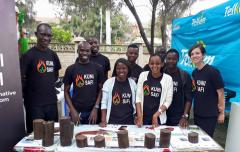Agnisumukh’s innovations support shift towards clean cooking in India
In a series of stories, we are profiling the four winners of the 2020 Energy Access Booster Award, offered to entrepreneurs operating in Africa and Asia, focusing on two sectors: clean cooking and waste-to-energy. The awards are sponsored by TOTAL, ENEA Consulting, Acumen and Sustainable Energy for All (SEforALL).
Highlights
The world will need to make a major push to provide 2.8 billion people with clean cooking solutions by 2030. To meet this challenge, new technologies and fuels will need to be developed and deployed that are cost-effective, have reduced carbon footprints and minimize people’s exposure to harmful fumes.
Hari Rao and his Bangalore-based company, Agnisumukh, are devoted to this type of cooking solution. In 2006, Rao, a cooking enthusiast and someone who loves experimenting with Indian cuisine, first identified a lack of innovation in cooking technologies. Liquefied petroleum gas (LPG) burners were used extensively in domestic and commercial kitchens in India and Asia.
The problem that Rao saw in this technology was that blue flame commercial gas burners create soot and have significant heat loss, making them inefficient in terms of the amount of fuel used to cook. On top of that, keeping pots and pans clean and the maintenance of burners and exhaust systems proved to be challenging.
Over the years, Rao’s research would lead to smokeless, residue-free, noiseless and flameless industrial stoves that are more economical to use and present lower health risks to users. In 2014, he founded Agnisumukh, which means “the good face of fire.” Agnisumukh manufactures commercial kitchen equipment ranging from clean cookstoves to steam boilers driven by innovative, energy-efficient radiant heat gas burner systems.
“As a natural property, flame and heat tend to accumulate at the centre. We have innovated a mechanism in gas burners that regulates this natural tendency and spreads the flame evenly as a thin layer by turning into uniform radiant heat,” says Rao.
Agnisumukh’s energy-efficient burner system, driven by LPG, natural gas or biogas, emits flameless horizontal radiant heat at a low gas pressure without producing any carbon soot.
The company says that the cookstoves help users save approximately 30 percent in fuel, reducing overall demand for LPG, natural gas or biogas. This efficiency has led to a carbon savings of approximately 7,337 tons based on its current customer base. Meanwhile, Agnisumukh’s stoves provide an alternative to traditional cooking methods like burning firewood. Therefore, the company estimates that its sales to date have saved 469,201 of trees. Because they produce zero soot, this also saves 1,715,850 litres of water normally required for cleaning.
Today, Agnisumukh stoves are used by more than 100 clients in about 500 kitchens throughout India. Its clients include major hotel and restaurant chains, hospitals, and even the kitchens of the President of India and the Prime Minister’s Office.
Over the years, the company has won many prizes for its innovations. Rao says that the financial prize provided by this year’s Energy Access Booster award will help the company pursue further R&D efforts to improve current products and develop new ones. The company recently entered a licensing agreement with the Indian Institute of Technology, Guwahati to market the institute’s Porous Radiant Burner technology. The Energy Access Booster Award will help Agnisumukh commercialize this technology and expand its share in the commercial kitchen market.
Related content

SDG7 News
30 Apr 2020

SDG7 News
29 Jun 2020

SDG7 News
26 Mar 2020

SDG7 News
06 Dec 2019
